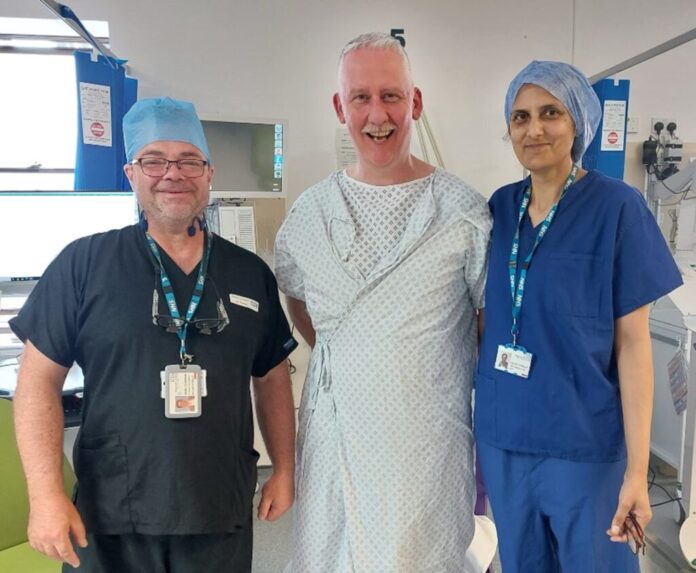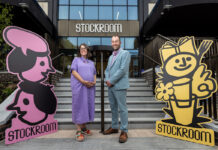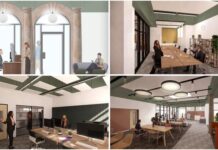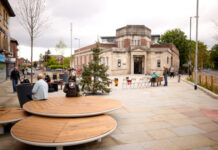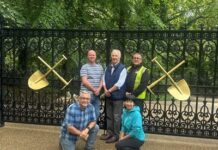A new method of helping people who suffer with sleep apnoea has been successfully performed at Manchester Royal Infirmary, with the potential to change lives.
The Ear, Nose and Throat team at the hospital, which is run by Manchester University NHS Foundation Trust, are the first team outside of London to perform a procedure that inserts a special implant, known as hypoglossal nerve stimulators, into patients who are unable to sleep due to sleep apnoea.
Sleep apnoea is when your breathing stops and starts while you sleep. The most common type is called obstructive sleep apnoea, the tongue or soft palate relax and narrow or block the airway – cutting off breathing.
The revolutionary new implant is no larger than a thin matchbox and is inserted into the patient’s chest. It then sends electrical pulses to the muscles blocking the airway as the patient sleeps, keeping it open and allowing breathing to regulate as normal.
Paul Hardy, 53, was the first ever patient in the UK, outside of London, to have the new treatment. He was diagnosed with sleep apnoea in 2019, the condition was ruining his life and with no solution in sight, he was happy to take the risk and be the first person to have the procedure at Manchester Royal Infirmary:
“Not being able to sleep sounds quite simple and a common problem, but when I say I couldn’t sleep, I mean I didn’t have more than a couple of hours a night at best. On the nights where I did get one or two hours, I would wake up with a hangover feeling; headache, bloodshot eyes and I’d be deaf in one ear. The lack of oxygen from sleep apnoea worsened my physical and mental health was really suffering.
“Around that time I’d just started a new job, I’d be struggling to stay functional and was worried what my new colleagues would think – the best I could do was get half an hour of sleep at lunch and then plough on. It was a similar story socially, if I’d go to see friends it wasn’t uncommon for me to involuntarily fall asleep because I was so tired all the time.
“It was also changing me as a person, I naturally became quite a grumpy person and it really affected my relationships with people. Before I was diagnosed with sleep apnoea and understood what was happening, I thought I was having a complete mental breakdown.”
The common treatment for sleep apnoea is a continuous positive airway pressure (CPAP) machine, a device the patient attaches to their face at night that helps keep them breathing. But many people find this uncomfortable and prohibitive to them falling asleep.
“Having a CPAP machine strapped to my face felt invasive and was actually adding to my sleep problems and giving me panic attacks, so I stopped using it.
“That’s when the sleep team at Trafford Hospital told me about a new procedure for alternative treatment, I was desperate and would have tried anything. I was supposed to be on holiday in Spain, but I cancelled everything to make sure I could do it.”
The revolutionary procedure sees the implant inserted in the chest of the patient, with electrodes running up the neck and to the back of the tongue. The device then sends a pulse to the tongue, preventing it from blocking the throat and maintaining a clear airway.
“I was anxious ahead of the operation as it’s quite a thing to go through with some sensitive areas being opened up. I also had quite the audience as being the first to have it, my procedure had caused quite a stir in the medical profession and there were more than a few people in the room watching me go under the knife. I then had a month of waiting whilst my body healed before I could come back to Manchester Royal Infirmary to have it switched on.
“The switching on was quite funny, there are nine levels to its power – when they put it on nine I thought my tongue was going to fire out my mouth. Since then, I’ve worked up from one to nine slowly and my life is transformed. After four days I woke up having had seven hours sleep for the first time in at least six years.
“I couldn’t believe it, emotionally it’s a really hard thing to describe. I went to sleep and woke up feeling like a normal person. My energy is up, my mental health is improved, I’m better at work and with my friends and my partner doesn’t have to listen to me snore like a drain.
“It’s also felt rewarding being the first to have the implant, as the Hospital has been putting me in touch with others about to go through the process so I can help support them with my experiences.
“It used to be that I couldn’t even walk to the train station without feeling exhausted, but now it’s no problem and I can live my life like everyone else. There’s still a way to go, but mentally I have seen a massive change – it’s a relief to be normal again.”

